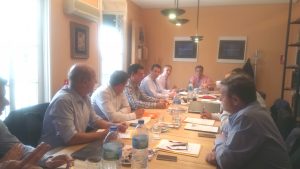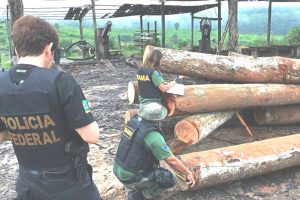NOTA DE PRENSA.
18, Septiembre, 2017.
AEIM finaliza el informe de evaluación de riesgos (EUTR) sobre Brasil.
Aprobado en la última reunión de Junta Directiva celebrada el 15 de septiembre.

AEIM, Junta Directiva. 15, Septiembre, 2017.
En la última reunión de Junta Directiva de AEIM (Asociación Española del Comercio e Industria de la Madera) celebrada el 15 de septiembre, se aprobó el informe final relativo a la evaluación de riesgos (EUTR. Sistema de Diligencia Debida de AEIM) sobre Brasil.
Dicho informe ha sido elaborado por el “Comité de expertos” designado en la pasada Asamblea General, celebrada en marzo de este año. El informe, referido a la madera tropical aserrada, se centra en el análisis de la documentación oficial que debe requerirse para acreditar el origen legal de la madera, según las exigencias del Reglamento Europeo de la Madera (EUTR) y en consonancia con el Sistema de Diligencia Debida (SDD) que se han comprometido seguir las empresas asociadas en AEIM.
En el mismo se analiza, de manera rigurosa, la documentación oficial que acredita el origen legal de la madera, distinguiendo las diferentes zonas o estados de Brasil. En concreto:
– Zona de Pará.
– Región de Matto Grosso.
– Otros estados, excepto para las zonas anteriores.
Además, el control de la legalidad que ampara la documentación, cubre toda la cadena de suministro desde el bosque hasta el embarque para exportación.
En el SDD de AEIM, (que puede consultarse en la Página Web www.maderalegal.info), Brasil figura como país de alto riesgo (en cuanto a madera tropical), por lo que este informe resultaba de gran relevancia, según el compromiso formalizado por todas las empresas asociadas en cuanto a la acreditación de la estricta legalidad del origen de las importaciones de productos de madera.
Asimismo, es preciso tener en cuenta que Brasil es el segundo proveedor a España de madera tropical aserrada, después de Camerún.
Los principales productos de madera tropical que Brasil exportó a España en 2016 fueron los siguientes:
• Madera aserrada: 10.310 m3 por un importe de 6.142 (mil) Euros.
• Suelos de madera: 4.590 m3 (3.834 (mil) Euros).
• Tablero contrachapado: 5.542 m3 (1.994 (mil) Euros.
Este informe sigue la línea del realizado el año pasado sobre Camerún y que fue acogido muy favorablemente, por parte, tanto de las empresas asociadas, como de la Autoridad Competente (EUTR) española.
Reseñar también que este informe queda integrado en el Sistema de Diligencia Debida (SDD), EUTR de AEIM, para uso exclusivo de las empresas asociadas. Dicho sistema se va actualizando periódicamente.
Finalmente, destacar que en el informe se subraya el esfuerzo que está realizando el IBAMA (Instituto Brasileño de Medio Ambiente) y los notables avances que se están consiguiendo, con el lanzamiento oficial del “Sistema Nacional de Control de Origen de productos forestales” (SINAFLOR). Se trata de un procedimiento tecnológico que va a permitir que el órgano de control ambiental haga un rastreo de toda la cadena productiva de la madera, desde su extracción en la selva hasta la llegada a las serrerías, aportando más transparencia al proceso y mejorando el trabajo de fiscalización de los agentes forestales.
Para más información:
PRESS RELEASE
18, September, 2017
Risk assessment (EUTR) final report on Brazil, finished by AEIM.
In accordance with its Due Diligence System (SDD).
At the last meeting of the Board of Directors of AEIM (Spanish Timber Trade Federation) held in Madrid on 15, September, final report on risk assessment (EUTR) on Brazil was approved.
This report has been made by the “Committee of Experts” appointed at the last General Meeting held in March of this year. The report, referred to tropical sawn timber, focuses on the analysis of the official documentation that must be required to prove the legal origin of the timber, according to the requirements of the EUTR and in line with the Due Diligence System (DDS) which AEIM members have committed to follow.
In the referred report, the official documentation that accredits the legal origin of the timber is assessed, according to the different areas or states of Brazil.
That is to say:
– Pará area.
– Region of Matto Grosso.
– Other states, except for the previous zones.
In addition, legality assessment backed by the documents, covers the entire supply chain from the forest to the shipment for export.
AEIM DDS (which can be consulted on the Web page www.maderalegal.info), considers Brazil as a high-risk country (in terms of tropical timber), so this report is very relevant, according to the formalized commitment by all member companies in the accreditation of the strict legality of the origin of the imports of timber products.
In addition, it should be noted that Brazil is the second supplier of tropical sawn timber to Spain, after Cameroon.
The main products that Brazil exported to Spain in 2016 are the following:
• Sawn Tropical Timber: 10,310 m3 to an amount of 6,142 (thousand) Euros.
• Timber flooring: 4.590 m3 (3.834 thousand) Euros.
• Tropical plywood: 5.542 m3 (1.994 (thousand) Euros.
This final report on Brazil follows the line taken last year on Cameroon report which was received very positively by both member companies and the Spanish Competent Authority (EUTR).
Finally, the report stresses the efforts being made by IBAMA (Brazilian Institute of the Environment) and the remarkable progress, with the official launch of the “National System of Control of Origin of Forest Products” (SINAFLOR ). It is a technological procedure that will allow the environmental control Body to track the entire production chain of the timber, from its extraction in the forests to the arrival at the sawmills, providing more transparency to the process and improving the work Control of forest agents.
For more information:
AEIM: www.aeim.org aeim@aeim.org
EUTR website: www.maderalegal.info



